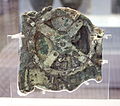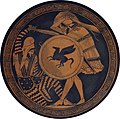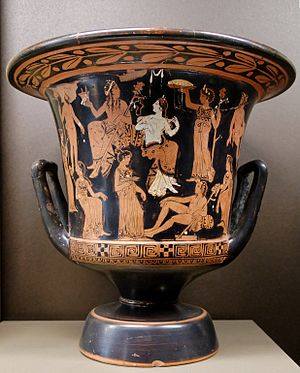
Back بوابة:اليونان القديمة Arabic Portal:Qədim Yunanıstan Azerbaijani Партал:Старажытная Грэцыя Byelorussian Portal:Griechische Antike German Πύλη:Αρχαία Ελλάδα Greek Portal:Antigua Grecia Spanish Portail:Grèce antique French Portal:Grecia antiga Galician פורטל:יוון העתיקה HE Պորտալ:Հին Հունաստան Armenian
The Ancient Greece Portal

Ancient Greece (Greek: Ἑλλάς, romanized: Hellás) was a northeastern Mediterranean civilization, existing from the Greek Dark Ages of the 12th–9th centuries BC to the end of classical antiquity (c. 600 AD), that comprised a loose collection of culturally and linguistically related city-states and other territories. Most of these regions were officially unified only once, for 13 years, under Alexander the Great's empire from 336 to 323 BC. In Western history, the era of classical antiquity was immediately followed by the Early Middle Ages and the Byzantine period.
Three centuries after the Late Bronze Age collapse of Mycenaean Greece, Greek urban poleis began to form in the 8th century BC, ushering in the Archaic period and the colonization of the Mediterranean Basin. This was followed by the age of Classical Greece, from the Greco-Persian Wars to the 5th to 4th centuries BC, and which included the Golden Age of Athens. The conquests of Alexander the Great spread Hellenistic civilization from the western Mediterranean to Central Asia. The Hellenistic period ended with the conquest of the eastern Mediterranean world by the Roman Republic, and the annexation of the Roman province of Macedonia in Roman Greece, and later the province of Achaea during the Roman Empire.
Classical Greek culture, especially philosophy, had a powerful influence on ancient Rome, which carried a version of it throughout the Mediterranean and much of Europe. For this reason, Classical Greece is generally considered the cradle of Western civilization, the seminal culture from which the modern West derives many of its founding archetypes and ideas in politics, philosophy, science, and art. (Full article...)
Selected article -

In classical antiquity, the Hellenistic period covers the time in Mediterranean history after Classical Greece, between the death of Alexander the Great in 323 BC and the death of Cleopatra VII in 30 BC, which was followed by the ascendancy of the Roman Empire, as signified by the Battle of Actium in 31 BC and the Roman conquest of Ptolemaic Egypt the following year, which eliminated the last major Hellenistic kingdom. Its name stems from the Ancient Greek word Hellas (Ἑλλάς, Hellás), which was gradually recognized as the name for Greece, from which the early modern 19th century historiographical term Hellenistic was derived. The term "Hellenistic" is to be distinguished from "Hellenic" in that the latter refers to Greece itself, while the former encompasses all the ancient territories of the period which had come under significant Greek influence, in particular the Hellenized Middle East, after the conquests of Alexander the Great.
After the Macedonian conquest of the Achaemenid Empire in 330 BC and its disintegration shortly thereafter, Hellenistic kingdoms were established throughout south-west Asia (Seleucid Empire, Kingdom of Pergamon), north-east Africa (Ptolemaic Kingdom) and South Asia (Greco-Bactrian Kingdom, Indo-Greek Kingdom). This resulted in an influx of Greek colonists and the export of Greek culture and language to these new realms, a breadth spanning as far as modern-day India. These new Greek kingdoms were also influenced by the indigenous cultures, adopting local practices where deemed beneficial, necessary, or convenient. Hellenistic culture thus represents a fusion of the ancient Greek world with that of Western Asian, Northeastern African, and Southwestern Asian. The consequence of this mixture gave rise to a common Attic-based Greek dialect, known as Koine Greek, which became the lingua franca throughout the ancient world. (Full article...)Selected location -
Thessaly (⫽ˈθɛsəli⫽ THESS-ə-lee; Greek: Θεσσαλία, romanized: Thessalía [θesaˈli.a]; ancient Thessalian: Πετθαλία, Petthalía) is a traditional geographic and modern administrative region of Greece, comprising most of the ancient region of the same name. Before the Greek Dark Ages, Thessaly was known as Aeolia (Ancient Greek: Αἰολία, Aiolía), and appears thus in Homer's Odyssey.
Thessaly became part of the modern Greek state in 1881, after four and a half centuries of Ottoman rule. Since 1987 it has formed one of the country's 13 regions and is further (since the Kallikratis reform of 2011) sub-divided into five regional units and 25 municipalities. The capital of the region is Larissa. Thessaly lies in northern central Greece and borders the regions of Macedonia to the north, Epirus to the west, Central Greece to the south, and the Aegean Sea to the east. The Thessaly region also includes the Sporades islands. (Full article...)Did you know...
- ... that the Greeks did not have a term for "religion"?
- ... that Ancient Greek cuisine was characterized by its frugality, reflecting agricultural hardship?
- ... that the economy of ancient Greece was characterized by the extreme importance of agriculture, all the more so because of the relative poverty of Greece's soil?
Related portals
Selected biography -
Cleisthenes (⫽ˈklaɪsθɪniːz⫽ KLYS-thin-eez; Greek: Κλεισθένης), or Clisthenes (c. 570 – c. 508 BC), was an ancient Athenian lawgiver credited with reforming the constitution of ancient Athens and setting it on a democratic footing in 508 BC. For these accomplishments, historians refer to him as "the father of Athenian democracy". He was a member of the aristocratic Alcmaeonid clan. He was the younger son of Megacles and Agariste making him the maternal grandson of the tyrant Cleisthenes of Sicyon. He was also credited with increasing the power of the Athenian citizens' assembly and for reducing the power of the nobility over Athenian politics.
In 510 BC, Spartan troops helped the Athenians overthrow the tyrant Hippias, son of Peisistratus. Cleomenes I, king of Sparta, put in place a pro-Spartan oligarchy headed by Isagoras. However, Cleisthenes, with the support of the middle class and aided by democrats, took over. Cleomenes intervened in 508 and 506 BC, but could not stop Cleisthenes and his Athenian supporters. Through Cleisthenes' reforms, the people of Athens endowed their city with isonomic institutions—equal rights for all citizens (though only free men were citizens)—and established ostracism as a punishment. (Full article...)General images -
Selected picture
Topics
Life: Agriculture · Art · Cuisine · Democracy · Economy · Language · Law · Medicine · Paideia · Pederasty · Pottery · Prostitution · Slavery · Technology · Olympic Games
Philosophers: Pythagoras · Heraclitus · Parmenides · Protagoras · Empedocles · Democritus · Socrates · Plato · Aristotle · Zeno · Epicurus
Authors: Homer · Hesiod · Pindar · Sappho · Aeschylus · Sophocles · Euripides · Aristophanes · Menander · Herodotus · Thucydides · Xenophon · Plutarch · Lucian · Polybius · Aesop
Buildings: Parthenon · Temple of Artemis · Acropolis · Ancient Agora · Arch of Hadrian · Temple of Zeus at Olympia · Colossus of Rhodes · Temple of Hephaestus · Samothrace temple complex
Chronology: Aegean civilization · Minoan Civilization · Mycenaean civilization · Greek dark ages · Classical Greece · Hellenistic Greece · Roman Greece
People of Note: Alexander The Great · Lycurgus · Pericles · Alcibiades · Demosthenes · Themistocles · Archimedes · Hippocrates
Art and Sculpture: Kouroi · Korai · Kritios Boy · Doryphoros · Statue of Zeus · Discobolos · Aphrodite of Knidos · Laocoön · Phidias · Euphronios · Polykleitos · Myron · Parthenon Frieze · Praxiteles
Subcategories
Things to do
 |
Here are some tasks awaiting attention:
|
Associated Wikimedia
The following Wikimedia Foundation sister projects provide more on this subject:
-
Commons
Free media repository -
Wikibooks
Free textbooks and manuals -
Wikidata
Free knowledge base -
Wikinews
Free-content news -
Wikiquote
Collection of quotations -
Wikisource
Free-content library -
Wikiversity
Free learning tools -
Wiktionary
Dictionary and thesaurus
© MMXXIII Rich X Search. We shall prevail. All rights reserved. Rich X Search























































